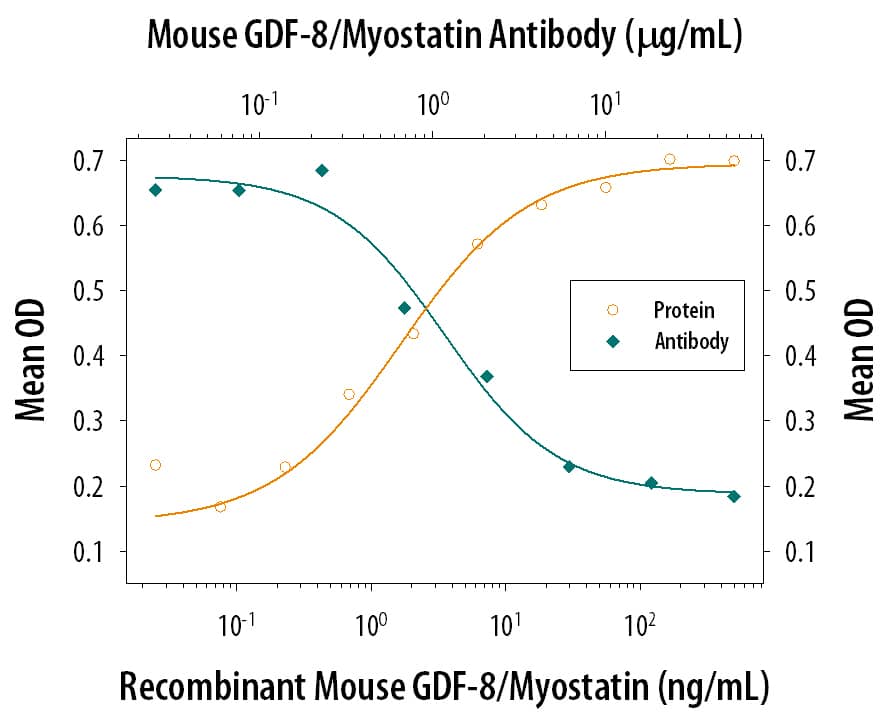Human/Mouse/Rat GDF-8/Myostatin Antibody
R&D Systems, part of Bio-Techne | Catalog # AF788


Key Product Details
Species Reactivity
Validated:
Human, Mouse, Rat
Cited:
Human, Mouse, Rat, Rabbit
Applications
Validated:
Immunohistochemistry, Neutralization, Western Blot
Cited:
Immunocytochemistry, Immunohistochemistry, Immunohistochemistry-Frozen, In vivo assay, Neutralization, Western Blot
Label
Unconjugated
Antibody Source
Polyclonal Goat IgG
Product Specifications
Immunogen
E. coli-derived recombinant mouse GDF-8/Myostatin
Asp268-Ser376
Accession # O08689
Asp268-Ser376
Accession # O08689
Specificity
Detects human, mouse, and rat GDF-8/Myostatin in direct ELISAs and Western blots.
Clonality
Polyclonal
Host
Goat
Isotype
IgG
Endotoxin Level
<0.10 EU per 1 μg of the antibody by the LAL method.
Scientific Data Images for Human/Mouse/Rat GDF-8/Myostatin Antibody
Detection of Recombinant Human, Mouse, and Rat GDF-8/Myostatin by Western Blot.
Western blot shows 25 ng of Recombinant Human/Mouse/Rat GDF-8/Myostatin (788-G8), Recombinant Human/Mouse/Rat GDF-11/BMP-11 (Catalog # 1958-GD), Recombinant Human BMP-6 (507-BP), and Recombinant Mouse BMP-6 (Catalog # 6325-BM). PVDF Membrane was probed with 0.1 µg/mL of Goat Anti-Human/Mouse/Rat GDF-8/Myostatin Antigen Affinity-purified Polyclonal Antibody (Catalog # AF788) followed by HRP-conjugated Anti-Goat IgG Secondary Antibody (Catalog # HAF109). A specific band was detected for GDF-8/Myostatin at approximately 14 kDa (as indicated). This experiment was conducted under reducing conditions and using Immunoblot Buffer Group 3.GDF‑8/Myostatin in Mouse Embryo.
GDF-8/Myostatin was detected in immersion fixed frozen sections of mouse embryo (10 d.p.c., section through neural tube) using Goat Anti-Human/Mouse/Rat GDF-8/Myostatin Antigen Affinity-purified Polyclonal Antibody (Catalog # AF788) at 15 µg/mL overnight at 4 °C. Tissue was stained using the Anti-Goat HRP-DAB Cell & Tissue Staining Kit (brown; CTS008) and counterstained with hematoxylin (blue). View our protocol for Chromogenic IHC Staining of Frozen Tissue Sections.Hemoglobin Expression Induced by GDF‑8/Myostatin and Neutralization by Mouse GDF‑8/Myostatin Antibody.
Recombinant Mouse GDF-8/Myostatin (Catalog # 788-G8) increases hemoglobin expression in the K562 human chronic myelogenous leukemia cell line in a dose-dependent manner (orange line), as measured by the psuedoperoxidase assay. Hemoglobin expression elicited by Recombinant Mouse GDF-8/Myostatin (30 ng/mL) is neutralized (green line) by increasing concentrations of Goat Anti-Human/Mouse/Rat GDF-8/Myostatin Antigen Affinity-purified Polyclonal Antibody (Catalog # AF788). The ND50 is typically 0.6-3 µg/mL.Applications for Human/Mouse/Rat GDF-8/Myostatin Antibody
Application
Recommended Usage
Immunohistochemistry
5-15 µg/mL
Sample: Perfusion fixed frozen sections of mouse embryo (10 d.p.c., section through neural tube)
Sample: Perfusion fixed frozen sections of mouse embryo (10 d.p.c., section through neural tube)
Western Blot
0.1 µg/mL
Sample: Recombinant Human/Mouse/Rat GDF‑8/Myostatin (Catalog # 788-G8)
Sample: Recombinant Human/Mouse/Rat GDF‑8/Myostatin (Catalog # 788-G8)
Neutralization
Measured by its ability to neutralize GDF‑8/Myostatin-induced hemoglobin expression in the K562 human chronic myelogenous leukemia cell line. The Neutralization Dose (ND50) is typically 0.6-3 µg/mL in the presence of 30 ng/mL Recombinant Mouse GDF‑8/Myostatin.
Reviewed Applications
Read 4 reviews rated 3.5 using AF788 in the following applications:
Formulation, Preparation, and Storage
Purification
Antigen Affinity-purified
Reconstitution
Reconstitute at 0.2 mg/mL in sterile PBS. For liquid material, refer to CoA for concentration.
Formulation
Lyophilized from a 0.2 μm filtered solution in PBS with Trehalose. *Small pack size (SP) is supplied either lyophilized or as a 0.2 µm filtered solution in PBS.
Shipping
Lyophilized product is shipped at ambient temperature. Liquid small pack size (-SP) is shipped with polar packs. Upon receipt, store immediately at the temperature recommended below.
Stability & Storage
Use a manual defrost freezer and avoid repeated freeze-thaw cycles.
- 12 months from date of receipt, -20 to -70 °C as supplied.
- 1 month, 2 to 8 °C under sterile conditions after reconstitution.
- 6 months, -20 to -70 °C under sterile conditions after reconstitution.
Background: GDF-8/Myostatin
References
- Storm, E.E. et al. (1994) Nature 368:639.
- Sharma, M. et al. (1999) J. Cell Physiol. 180:1.
- McPherron, A.C. et al. (1997) Nature 387:83.
- Lee, S.J. et al. (2001) Proc. Natl. Acad. Sci. USA 98:9306.
- Kim, H.S. et al. (2001) Biochem. Biophys. Res. Commun. 281:902.
Long Name
Growth Differentiation Factor 8
Alternate Names
GDF8, MSLHP, MSTN, Myostatin
Gene Symbol
MSTN
UniProt
Additional GDF-8/Myostatin Products
Product Documents for Human/Mouse/Rat GDF-8/Myostatin Antibody
Product Specific Notices for Human/Mouse/Rat GDF-8/Myostatin Antibody
For research use only
